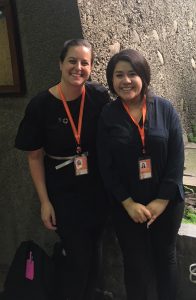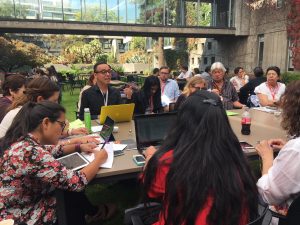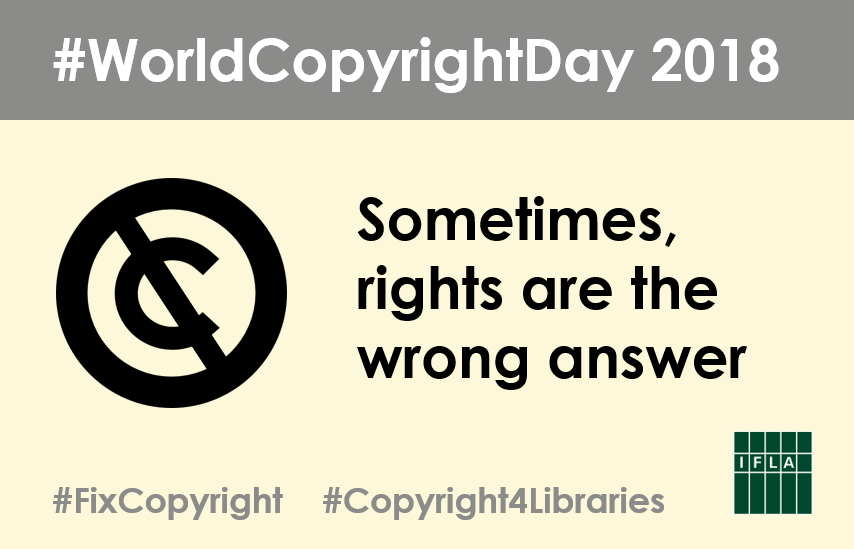
The concept of exclusive author’s rights has undoubtedly shaped the creative economy of today. By turning creativity into an investment good, it has reduced reliance on rich sponsors to cover costs, as used to be the case in the art market for example. Instead, the focus of efforts to cover costs is on charging for access to, or use of, a work. On the back of this, an industry has emerged, built around the management (i.e. making money from) of rights, with a view to recovering costs and maximising profits.
As frequently set out in the news page of IFLA’s own Advisory Committee on Copyright and other Legal Matters (CLM), and many other blogs, websites and other fora, there is a long-standing tension as to how to achieve the right balance, in the short- and long-term, between rightholders and users. Specialists in the exploitation of rights play a key role in these discussions, usually to defend the primacy of copyrights over exceptions. On questions such as copying, lending, and making works available online, this is a valid discussion.
However, there is also frequently a tendency to try to use copyright to ‘solve’ other issues. Given the broad scope of copyright – all but the most basic forms of expression – it is necessary to take extreme care in applying it outside of its original purpose. In short, and as the rest of this blog will suggest, there are many questions whose solutions definitely should be out of copyright.
Fake News: The economic situation of the ‘quality’ press has been one of the most dramatic stories of the last few years. While some have established paywalls, others are now competing for attention, and so advertising revenues with websites which knowingly share stories which play to populism, regardless of facts. This shift to the attention-grabbing is, arguably, one of the reasons behind the ‘fake news’ phenomenon.
So what does copyright have to do with this? In Europe, press publishers (and some MEPs) have argued that awarding new rights could provide an income boost that would help pay for quality journalism. The target? News aggregators such as Google News and other smaller companies, in the hope of claiming a share of the spectacular revenues they are earning.
The problem is that new rights would not only create revenues for the ‘quality’ press, but indeed for any news website, regardless of how well researched its content is. By attacking news aggregators in general, a vital means of allowing readers to understand the different perspectives taken on a given issue would be under threat. Difficulties in enforcing legitimate rights could be solved by a presumption of representation, saving time in proving the legal standing of the publisher. An imbalance in power between commercial operators should be a competition issue. Copyright is certainly the wrong tool.
Privacy: a bizarre connection was made in the context of discussions about Cambridge Analytica in the European Parliament. A blog on this subject has already appeared on this site, but in short, the argument was that the sort of illicit use of personal data harvested from Facebook users seen in this case could have been avoided if publishers were allowed to claim revenues for licensing text and data mining.
There is much to be said for individuals understanding how their data may be used when signing up for services such as Facebook, and recent EU legislation promotes ‘data ownership’ – i.e. the right of individuals to decide what happens with their own data. But this is not a copyright question.
Indeed, zealousness in monetising and protecting copyrighted works may even pose a threat to privacy. New technology creates the possibility to monitor how individuals use works, for example which pages or chapters of a book they are consulting, what analysis they are performing (in the case of text and data mining), and even the speed at which they read different elements. In effect, copyright is used as an excuse to look over a readers’ shoulder in order to harvest data that can be monetised.
As set out in IFLA’s response to the call for contributions on privacy in the digital age, such monitoring can have a chilling effect on free access to information. Copyright should not be used as an excuse to invade privacy.
Piracy: the Internet has certainly changed people’s expectations as to how easy it should be to access works. Where this access is seen as too expensive, or too complicated, users have often turned to piracy. This is undoubtedly illegal in and of itself. Much progress has been made where those managing rights have understood the need to provide easier access, for example through platforms such as Spotify or Amazon, or through maximising options for free access (see Clarivate’s purchase of Kopernio).
In parallel, there are legal efforts to crack down on those who make money from pirating goods. The concern comes when the focus of these efforts is less on those committing piracy, and more on the platforms that they use to do these. Where these platforms are also massively used for legitimate purposes, such efforts risk causing significant collateral damage.
In many countries, ‘safe harbour’ provisions offer protection to platforms, ensuring that they do not face liability for the actions of their users, as long as they respond to requests for content to be taken down. Yet these provisions are under attack, with calls for the conditions allowing sites to benefit from ‘safe harbour’ rules to be tightened, with, for example, an obligation to filter all uploads to check for infringement. The potential impact, for example on scientific or educational repositories, most of which will not have the funds, or the inclination to vet everything uploaded by users, could be disastrous.
Where there is piracy, the focus should be on better enforcement of existing rules, not on creating new ones. Once again, new copyrights are not the answer.
Text and Data Mining: digital technologies – and in particular the ability of computers to understand data and text – have opened up the way to far quicker analysis of scientific research, as well as any other digital materials (photos, Tweets, news stories…). Whereas a human reader needs time to read, understand, and extract meaning from an article, a computer can do this almost instantaneously, making it possible to draw on a much greater range of materials.
Text and Data Mining (TDM) is already leading to new discoveries, spotting connections and trends that would only have been possible before with an army of researchers. It also underpins artificial intelligence, one of the most promising fields of technological progress today.
What’s the link with copyright? Doubtless realising the potential value to researchers and others of TDM, publisher organisations are resisting efforts to clarify that mining activities should not be subject to copyright. This flies in the face of the Berne Convention, that underlines that mere facts – data – should be excluded from intellectual property protection.
As library organisations have frequently underlined in discussions in Europe, once there is legal access to a work (i.e. because it is freely available online, or where a subscription has been paid), there should be the right to analyse it. In short, the right to read should be the right to mine. Datasets created for the purposes of TDM need to be preserved in order to ensure that others can verify the results of analysis.
Where there are questions about privacy, data protection laws should apply. Where information has not been accessed legally in the first place, anti-piracy laws exist. TDM itself should be out of copyright.
Free Speech: the right to review – and critique – underpins free and open public debate. By discussing ideas, and taking them apart, it becomes possible for new ones to emerge. From formal news programmes to individual blogs and Twitter, quoting and reusing copyrighted works is essential not only to democracy, but also innovation and satire.
Yet there are documented cases of copyright being used to stifle free speech. Setting aside the clearly fraudulent, there are worrying cases of companies and others claiming infringement when their works are cited in the context of critique or review. For libraries encouraging users to move from being consumers to creators, for example by producing book reviews, research, or remixes, there is the real possibility of facing copyright restrictions.
This should not be the case. If criticism is unfairly harmful, there are defamation laws. Copyright should have nothing to do with free speech.
Amazon’s Dominance: Finally, it is certainly true that Amazon has caused immense disruption on the book market, and shifted a large share of sales away from traditional booksellers. That ‘bricks and mortar’ bookshops retain their relevance has been underlined by the fact that the same company is setting up its own physical outlets.
In parallel, Amazon was also quick to move into the eBook market, capturing a large share of sales, and also offering its services to people wanting to self-publish. With its own eBook tools, it has also been able to capture a large share of the value of eBooks from other publishers.
The result is a highly mixed picture – of harm to booksellers, but also the empowerment of new authors to reach readers. What is clear is that copyright is, again, not a solution to the position of Amazon. As with fake news, if one player in the market is so big that they can force others to do what they want, this is a competition issue, not a rights one.


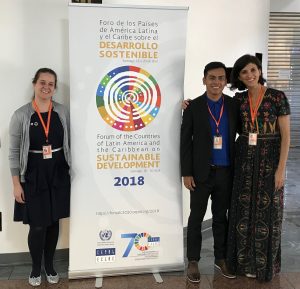 After taking active part in
After taking active part in 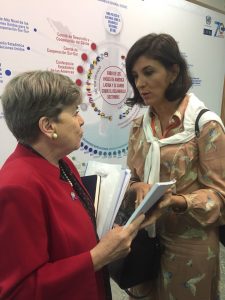 Adriana Cybele Ferrari (FEBAB President, Brazil and IFLA IAP participant) approached ECLAC’s Executive Secretary and delivered a copy of the
Adriana Cybele Ferrari (FEBAB President, Brazil and IFLA IAP participant) approached ECLAC’s Executive Secretary and delivered a copy of the 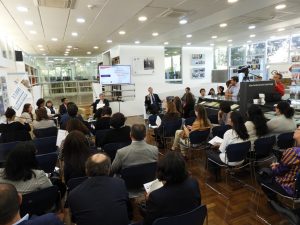 19 April was an extremely successful day for our IFLA delegation, with two main highlights: the side event hosted by ECLAC’s Hernán Santa Cruz Library in partnership with IFLA: “
19 April was an extremely successful day for our IFLA delegation, with two main highlights: the side event hosted by ECLAC’s Hernán Santa Cruz Library in partnership with IFLA: “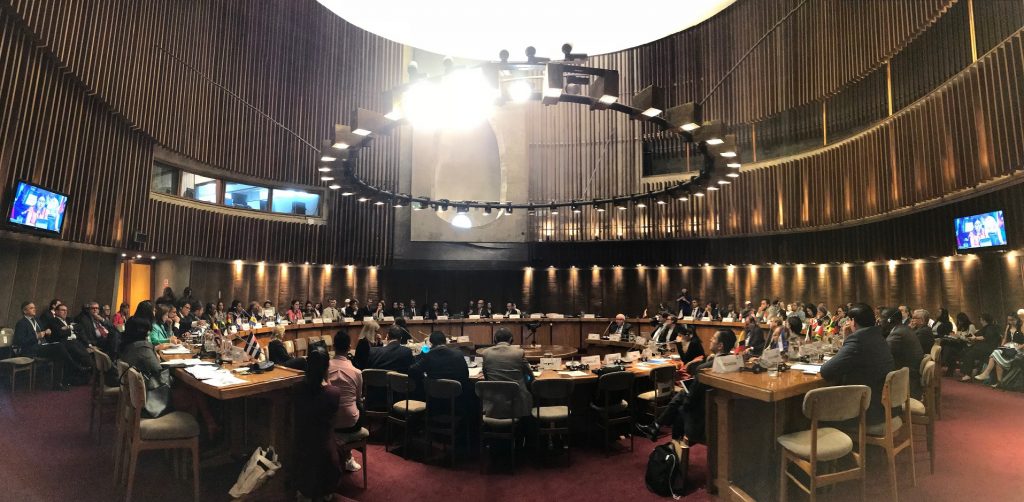
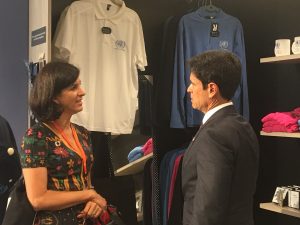 Adriana found her chance when she bumped into Enrique Villa da Costa Ferreira, National Secretary for Social Coordination of the Government Secretariat of the Office of the President of Brazil, and took the opportunity to introduce herself, present the work of libraries in Brazil, and ask to be included in the sectoral committees that work in the monitoring and implementation of the Agenda at the national level. Secretary Villa da Costa Ferreira provided guidance on how to get involved and Adriana promised to follow up.
Adriana found her chance when she bumped into Enrique Villa da Costa Ferreira, National Secretary for Social Coordination of the Government Secretariat of the Office of the President of Brazil, and took the opportunity to introduce herself, present the work of libraries in Brazil, and ask to be included in the sectoral committees that work in the monitoring and implementation of the Agenda at the national level. Secretary Villa da Costa Ferreira provided guidance on how to get involved and Adriana promised to follow up.
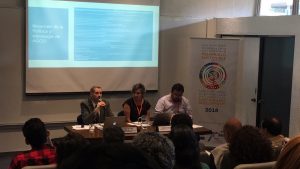
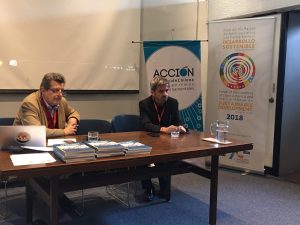
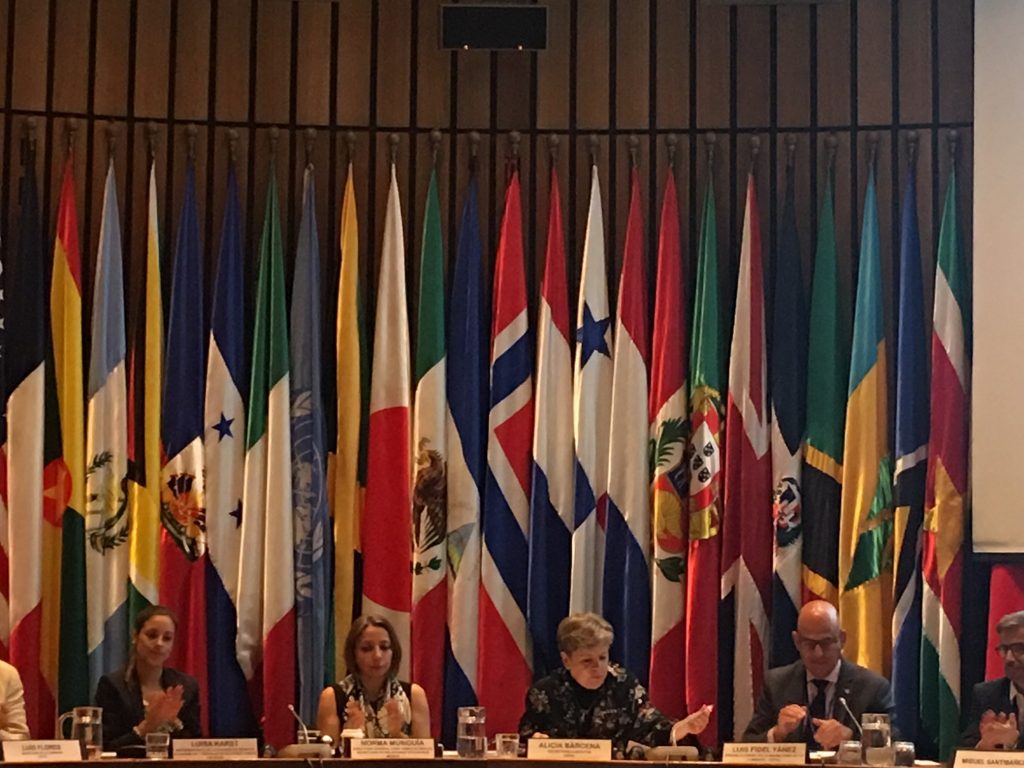
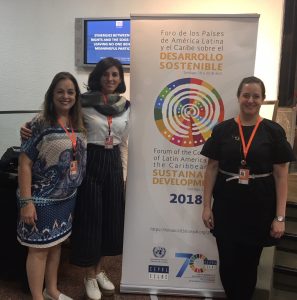 As a few highlights: as a result of networking with fellow Brazilian civil society members, Adriana was invited to be involved in the
As a few highlights: as a result of networking with fellow Brazilian civil society members, Adriana was invited to be involved in the 